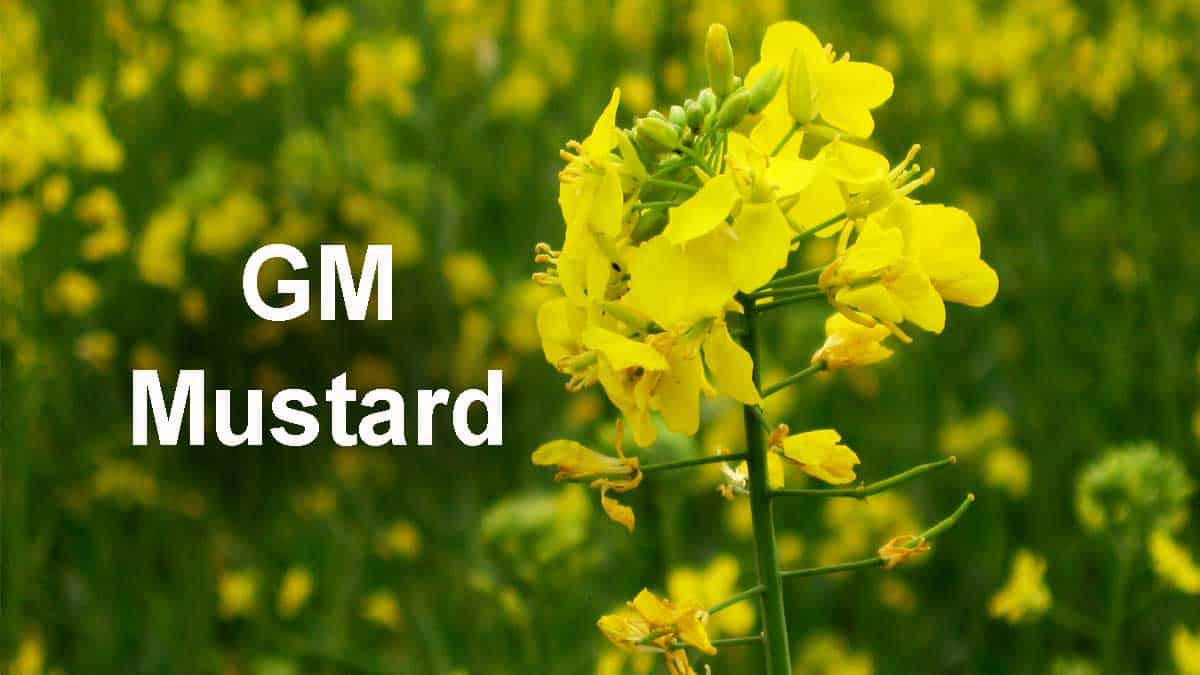What’s in today’s article?
- Why in News?
- GM Crop – about, legal provisions etc.
- News Summary
Why in News?
- Field trials of the transgenic mustard variety, DMH-11, revealed them to be higher yielding and they didn’t deter the pollination habits of honey bees.
- This was informed by the Union Minister of State (Independent Charge) of Science & Technology and Earth Sciences Dr Jitendra Singh in Rajya Sabha.
What are GM Crops?
- Conventional plant breeding involves crossing species of the same genus to provide the offspring with the desired traits of both parents.
- Genetic engineering aims to transcend the genus barrier by introducing an alien gene in the seeds to get the desired effects.
- The alien gene could be from a plant, an animal or even a soil bacterium.
- Eg., Bt cotton has two alien genes from the soil bacterium Bacillus thuringiensis (Bt).
- It allows the crop to develop a protein toxic to the common pest pink bollworm.
- In Bt brinjal, a gene allows the plant to resist attacks of fruit and shoot borer.
- Seeds produced using genetic engineering are called Genetically Modified Seeds.
What is the legal position of genetically modified crops in India?
- In India, the Genetic Engineering Appraisal Committee (GEAC) is the apex body that allows for commercial release of GM crops.
- In 2002, the GEAC had allowed the commercial release of Bt cotton.
- Use of the unapproved GM variant can attract a jail term of 5 years and fine of Rs 1 lakh under the Rules, 1989 (notified under Environmental Protection Act ,1986).
Background of GM Mustard
- Earlier, in 2017, the Genetic Engineering Appraisal Committee (GEAC) had cleared the proposal for commercial cultivation of GM mustard.
- However, the Union Environment Ministry vetoed it and suggested that the panel hold more studies on the GM crop.
- In October 2022, GEAC again cleared the proposal for commercial cultivation of genetically modified (GM) mustard – also known as Dhara Mustard Hybrid-11 (DMH-11).
News Summary
- In a written reply to a question in the Rajya Sabha, Dr Jitendra Singh said, GM mustard has been tested for three years (2010-11, 2011-12, 2014-15) against national check Varuna and zonal check RL1359 during confined field trials at multiple locations.
- Checks refer to reference varieties of mustard in a region.
- In this case, DMH-11 was tested against Varuna variety of mustard at national level and against RL1359 variety at zonal level.
- Usually, new varieties must prove themselves superior to be considered for commercial release.
- Checks refer to reference varieties of mustard in a region.
Key highlights of the information given by the minister
- Higher yielding variety
- DMH-11 has showed approximately 28 per cent more yield than the national check and 37 per cent more than the zonal checks.
- DMH-11 was safe for cultivation, food, and feed use
- Extensive studies were carried out on toxicity, allergenicity, compositional analyses, field trials, and environmental safety of GM mustard lines versus their non-transgenic comparators.
- It had provided evidence that DMH-11 was safe for cultivation, food, and feed use.
- Visitation of bees to the transgenic lines is similar to the non-transgenic counterparts.
- Why DMH-11 wasn’t classified as a ‘herbicide-tolerant’ seed
- GM Mustard not been classified as an Herbicide Tolerant (HT) crop variety despite the presence of the ‘bar’ gene.
- The ‘bar’ gene in the plant makes it resistant to a family of herbicides.
- The question of herbicide tolerance in DMH-11 is one of the most contentious issues.
- Activists are claiming that this will encourage farmers to more widely use a weedicide called glyphosate to protect mustard.
- Though largely used in tea plantations to save on labour costs, glyphosate has been indicted globally as a ‘probable carcinogen’ with the Union agricultural ministry this year issuing rules to limit its use.
- While replying to this question, the minister said the use of bar gene has been claimed and approved by the GEAC during hybrid seed production phase only.
- This is to maintain the genetic purity of hybrid seed by killing male fertile plants in female rows in seed production plot.
- It will not be used during commercial cultivation by the farmers
- GM Mustard not been classified as an Herbicide Tolerant (HT) crop variety despite the presence of the ‘bar’ gene.
- Transgenics were safe for bees and pollination
- As per studies conducted on Bt cotton, it was found that transgenics were safe for bees and pollination.
- There is no negative impact of Bt transgenic cotton cultivars on bees, brood rearing, pollen and nectar hoarding of Apis mellifera colonies as compared to non -transgenic cotton cultivars.
Q1) What is glyphosate?
Glyphosate is a widely used herbicide that controls broadleaf weeds and grasses. The use of glyphosate involves health hazards and risk to human beings and animals”. It has, however, not banned and only “restricted” its use.
Q2) What is GM mustard hybrid DMH-11?
Dhara Mustard Hybrid-11, otherwise known as DMH – 11, is a genetically modified hybrid variety of the mustard species Brassica juncea. It was developed by Professor Deepak Pental from the University of Delhi, with the aim of reducing India’s demand for edible oil imports.
Last updated on June, 2025
→ UPSC Notification 2025 was released on 22nd January 2025.
→ UPSC Prelims Result 2025 is out now for the CSE held on 25 May 2025.
→ UPSC Prelims Question Paper 2025 and Unofficial Prelims Answer Key 2025 are available now.
→ UPSC Calendar 2026 is released on 15th May, 2025.
→ The UPSC Vacancy 2025 were released 1129, out of which 979 were for UPSC CSE and remaining 150 are for UPSC IFoS.
→ UPSC Mains 2025 will be conducted on 22nd August 2025.
→ UPSC Prelims 2026 will be conducted on 24th May, 2026 & UPSC Mains 2026 will be conducted on 21st August 2026.
→ The UPSC Selection Process is of 3 stages-Prelims, Mains and Interview.
→ UPSC Result 2024 is released with latest UPSC Marksheet 2024. Check Now!
→ UPSC Toppers List 2024 is released now. Shakti Dubey is UPSC AIR 1 2024 Topper.
→ Also check Best IAS Coaching in Delhi























